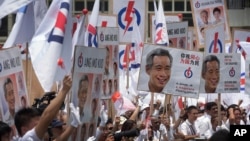Singapore's electorate goes to the polls this week with the governing People’s Action Party widely expected to again extend it’s more than 50-year winning streak at the polls. All 89 seats in parliament are being contested for the first time since Singapore gained independence in 1965, making the polls a key popularity test for the ruling party.
As Singaporeans vote for a new parliament Friday, the opposition Workers Party is banking on voter displeasure to increase its meager representation from seven seats in the 89 member house.
At electoral rallies, Workers Party leader Low Thai Khiang has spoken about how the governing party has failed to address social equity. He also called for more support to boost opposition representation in the parliament.
“The Workers Party believes that it is important for the next start of Singapore to be a Singapore of balanced representation. We believe in empowering citizens of Singapore to play a part in achieving happiness, prosperity and progress for our nation,” said Khiang.
The People’s Action Party (PAP) has won every single election since Singapore’s independence in 1965. From 1968 through to 1984 the opposition held no seats in parliament.
But in 2011 elections the ruling party faced a shock when its share of the popular vote slid to 60 per cent -- the lowest since coming to power in 1959.
PAP leaders argue that losing their supermajority in parliament will undermine their ability to manage policy.
It is unclear if this message will resonate with voters who have been concerned about access to public services, the country’s immigration policies and the health of the economy.
Daniel Martin, senior Asia economist with research house, Capital Economics, believes the governing party has sought to address voter concerns.
“What has been happening in the last five or so years is that the electorate has been increasingly critical of the government and in elections the government has been winning a smaller share. There has been a reaction from the government particularly fair complaints about immigration,” said Martin.
Bill Case, a political scientist from Hong Kong’s City University, said that despite the opposition parties’ calls for greater representation, in the final outcome the People’s Action Party will be returned to power. But in a country where voting is mandatory, the election offers a valuable gauge of the public’s assessment of the PAP’s leadership.
“There’s no question the PAP will win and it will win overwhelmingly and it will continue to dominate the parliament utterly. These elections are a measure of popular satisfaction or discontent. I guess that’s why they’re important. And that’s why the PAP certainly wants to win overwhelmingly – do better this time that it did last time. That’s the big question, whether it will or not,” said Case.









